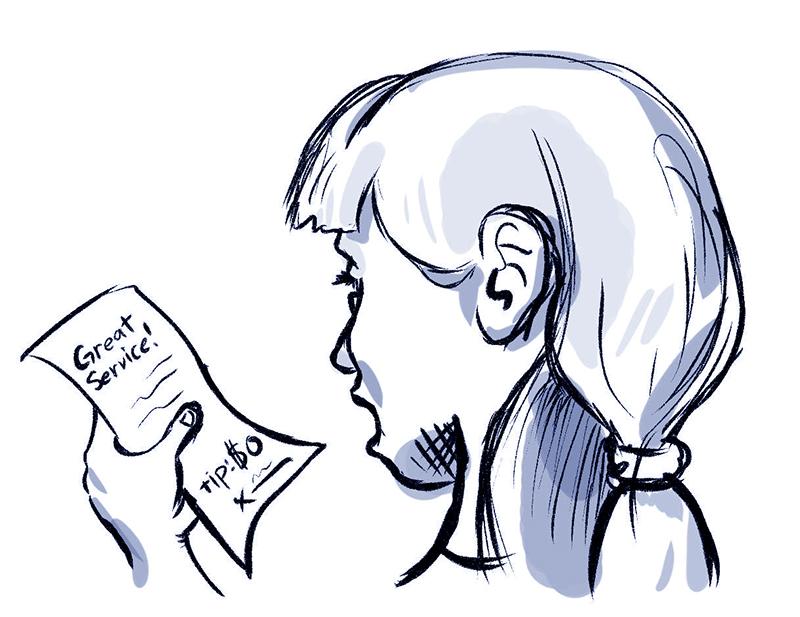Restaurant servers discuss changes in tipping law
March 6, 2014
Imagine walking into your favorite restaurant and sitting down waiting for your server to greet you but instead you are now bringing your own drinks, taking your own orders and delivering your own food. The feeling of hospitality would instantly be thrown out the window and the whole point of going out to eat is diminished when you are no longer being served.
In 2012, the IRS made a ruling under the Rev. Rul. 2012-18, which changes the 18 percent gratuity to large parties of six to eight plus from a tip to a wage.
Now, large chain restaurants such as the Cheesecake Factory, Chili’s, Chevy’s and Texas Roadhouse have all discontinued the requirement of gratuity tipping on parties of six or more. This new ruling has given the power back to the customer so that they can determine who receives the payment and how much. This has made many customers happier, however many servers are not in favor of this new ruling.
There are 990,000 restaurants in the U.S. that employ 13.5 million people that make up 10 percent of the U.S. total work force, according to the National Restaurant Association. Though tipping will not impact sales to restaurants, it will impact employee wages.
Servers are already hugely underpaid in multiple states due to a policy passed by the National Restaurant Association in 1966 and altered in 1991 to require that servers only need to be paid the minimum of $2.13 an hour, as long as their reported tips meet the difference of state minimum wages, according to an article in the Huffington Post.
This creates relatively large differences between the pay of servers who may work in a lower-sale restaurant and those who work for higher-end establishments. With the new law being enforced, changes surrounding automatic gratuities have altered server’s incomes immensely.
“This ruling makes it harder for me to want to serve people, not everyone who comes to a restaurant to eat knows how to tip properly … and serving a large party is a lot harder than it looks,” said Jordan Salvador, a 22-year-old full-time server at Claim Jumper.
Salvador has been serving tables for the past two years and he has been able to see his fair share of great tips and terrible ones.
“It isn’t always based on the service,” said Salvador, “A lot of people are just cheap and they should rethink dining out if they cannot leave extra for their server.”
Many servers today feel the same way as Salvador.
“Honestly, I feel that a lot of this has to do with how much a server is paid by the hour, and not just them the entire restaurant staff,“ said Omar Martinez, a 27-year-old full-time server at Olive Garden. When people come to a restaurant they are not only judging the service provided by their server but the conditions of the restaurant, said Martinez.
In some states, servers are being paid below minimum wage and rely on the amount of money they make in tips. Also, in most restaurants, servers also “tip-out” their bussers or bartenders, giving them more incentive to either buss tables or make beverages quicker. When the hourly wage of the server is low and people are not leaving good tips, the chances of them tipping out the bussers and bartenders decreases.
“Most people do not realize how much a restaurant is a unit and how all parts must work together for it to be a success,” said Martinez.
Recently, icon Oprah Winfrey shared her opinion on how someone should tip, depending on what restaurants they go to. According, to Winfrey’s “Guide to Tipping” a party should tip 15 to 20 percent of the total bill or 20 percent for a first-class place. This mindset is one that many customers have when going out to eat.
The issue with this may be that, even if the service was excellent, the customer may not feel obligated to tip their server at least 20 percent. This gives servers the feeling that even if they do a great job their customers will not take that into account.
“I have been serving tables for most of my life and I can say that people can be very cheap,” said Lester Coats, 54-year-old full-time server. He has witnessed people not leave him any tip even though they are constantly telling him how great his service was. This type of treatment can make any server just want to walk out and quit said Coats.
An alternative to this solution is that restaurants could opt to keep their original policies; pay taxes on the wages and have their employees receive their money through a paycheck instead of during their shifts. Depending on caliber or area of the restaurant, servers may experience little or no change at all.
“I work in an area where I’m commonly tipped 15 percent or above on every check; no longer having gratuity has not really impacted my job,” said Rodnisha Baker, a server at The Cheesecake F

